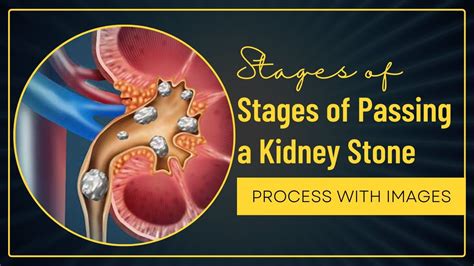How Long Does It Take to Pass a Kidney Stone?
Kidney stones are a painful experience, and a common question is: how long will this last? Unfortunately, there's no single answer. The time it takes to pass a kidney stone depends on several factors, including its size, shape, and your individual body's ability to expel it. This comprehensive guide will explore the factors influencing passage time and offer advice on managing the discomfort.
Factors Affecting Kidney Stone Passage Time
Several key factors determine how long you'll be dealing with a kidney stone:
1. Stone Size: The Biggest Factor
Size is paramount. Smaller stones, generally under 4mm, often pass without intervention within a few days to a couple of weeks. Larger stones, however, may require medical intervention. Stones over 1cm are less likely to pass spontaneously.
2. Stone Shape: Smooth or Sharp?
The shape significantly impacts passage. Smooth, round stones have a much easier time navigating the urinary tract than jagged, irregular stones. Sharp stones can cause more pain and potentially get stuck.
3. Location of the Stone
Where the stone is located within your urinary tract influences the passage time. A stone lodged in the ureter (the tube connecting the kidney to the bladder) will likely cause more intense pain and take longer to pass than a stone still residing in the kidney.
4. Individual Factors
Your overall health and hydration levels play a role. Proper hydration helps flush the stone out. Certain medical conditions can also impact the process.
How to Manage the Pain and Speed Up Passage (Potentially)
While you can't magically make the stone disappear, you can take steps to manage the pain and potentially help facilitate its passage:
1. Hydration is Key
Drink plenty of fluids, especially water. Aim for at least 2-3 liters per day. Increased fluid intake helps to flush the stone through your system.
2. Pain Management
Over-the-counter pain relievers like ibuprofen or naproxen can help manage the discomfort. In some cases, your doctor might prescribe stronger pain medication. Never self-medicate without consulting a doctor.
3. Dietary Changes (Consult your doctor)
Some dietary changes might help, but always consult your doctor before making significant changes to your diet. Reducing foods high in oxalate (like spinach and rhubarb) might be beneficial for some individuals, but this depends on the type of stone.
4. Medical Intervention
For larger stones or those causing significant complications, medical intervention may be necessary. This could include procedures like shock wave lithotripsy (SWL), ureteroscopy, or surgery. Your doctor will determine the best course of action based on your specific situation.
When to See a Doctor
Seek immediate medical attention if you experience:
- Severe pain that doesn't respond to over-the-counter pain relief.
- Blood in your urine.
- Fever or chills.
- Nausea or vomiting.
- Inability to urinate.
These symptoms could indicate a serious complication.
Conclusion: Patience and Professional Guidance
The time it takes to pass a kidney stone is highly variable. While many smaller stones pass relatively quickly, larger stones may require medical attention. Remember to stay hydrated, manage your pain appropriately, and consult your doctor for guidance and treatment if necessary. They can provide a more accurate estimate of passage time based on your specific situation. Don't hesitate to seek professional help – your health is paramount.
